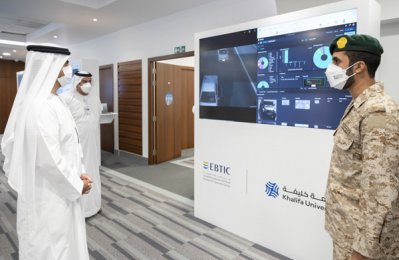Mars targets net zero greenhouse gas emissions by 2050
Mars, a global leader in confectionery, food, and pet care products and services, has announced its commitment to achieve net zero greenhouse gas (GHG) emissions across its full value chain by 2050.
More Stories
Mars, a global leader in confectionery, food, and pet care products and services, has announced its commitment to achieve net zero greenhouse gas (GHG) emissions across its full value chain by 2050.
The plan aligns with the most ambitious aim of the Paris Agreement to limit global temperature rises to 1.5C as well as regional sustainability goals across the GCC.
This stepped-up commitment follows findings in the July Intergovernmental Panel on Climate Change (IPCC) report which reinforced the urgency of achieving net zero globally to prevent the worst impacts of global warming – a critical focus of next month’s COP26 Climate Conference in Glasgow. Mars is joining the Science Based Targets Initiative’s ‘Business Ambition for 1.5C pledge’ and the Race to Zero, as the company accelerates its work to achieve net zero emissions by focusing on:
• Absolute emissions reductions across its entire GHG footprint including all scope 3 emissions such as indirect emissions (e.g., business travel, retail customer emissions, use of sold products, and product end-of-life) and setting 5-year milestones to drive action and track progress
• Eliminating deforestation in its supply chain – particularly in key raw materials that have the greatest impact on emissions
• Linking executive pay to delivering GHG value chain emission reductions
• Challenging Mars’ 20,000+ suppliers to take climate action and to set meaningful targets
Mars Chief Executive Officer Grant Reid said: “The scale of global intervention must be bolder and faster. Climate change is already impacting the planet and people’s lives. To mitigate this real and tangible threat, the science tells us net zero targets must be broad in their reach, capturing emissions across the entire value chain and plans need to have material, interim targets. We can’t wait decades to see progress.”
“However, all too often, this simply isn’t the case – and the gaps that exist in some net zero commitments risks undermining their credibility, and even more importantly, the climate action movement. We can’t allow that to happen.
“To deliver meaningful impact and ensure it is fit for purpose, our net zero target covers our entire GHG footprint, from how we source materials through to how consumers use our products and, we’re mobilizing our entire business around taking action now and hitting interim targets every five years.
“This is going to be a significant challenge, and it we won’t be able to achieve net zero without the collaboration of our associates, suppliers, customers, consumers and industry partners. It’s so important that we work together to drive scale and reach. We need to overhaul the supply chains which power global business and put an end to deforestation and the conversion of natural ecosystems to drive meaningful change now. We can’t use long-term ambitions as an excuse for inaction and delay,” Reid added.
Mars has been driving climate action on emissions for more than a decade with an existing commitment – set in 2009 - to achieve net zero in direct operations by 2040.
Mars aims to make a significant contribution to combat climate change across its operations in the Middle East and Africa by working to eliminate GHG emissions across its key sites in the region. The net zero pledge comes on the heels of the UAE’s recent commitment to reduce carbon emissions by 2050 and invest heavily to provide clean and renewable energy sources in the next three decades as part of its longstanding vision.
Other key regional markets for Mars include Saudi Arabia where sustainability is being placed as a strategic priority for its Vision 2030 agenda to create a green and circular economy, while also diversifying renewable clean energy sources. Mars is driving efficiencies to reduce water scarcity and increase clean energy across its King Abdullah City factory in Saudi Arabia by reducing energy consumption.
Another key environment initiative is for our Sixth of October City factory in Egypt where we plan to eliminate unsustainable water use in our value chain and promote responsible wastewater management.
This announcement builds on its existing Sustainable in a Generation Plan, advancing its previous pledge to cut emissions in its full value chain by 67% by 2050 and reaffirming an ambitious near-term target to cut GHGs in its full value chain by 27% by 2025.
A full net zero roadmap will be developed and published in 2022 to align with the anticipated Science-Based Target Initiative rules on net zero commitments, expected by the end of 2021.
To achieve net zero, some of the numerous initiatives active across Mars include:
• Transitioning to 100% renewable energy. Mars has already made strong progress towards its commitment to reach zero GHG emissions in its direct operations by 2040 (including factories, offices, and veterinary practices). It now sources 100% renewable electricity for the entirety of its direct operations in 11 countries, accounting for more than 54% of its global electricity needs, with plans to make the switch in another 8 countries by 2025.
• Urgently redesigning its supply chains to stop deforestation. Mars is redesigning its supply chains to help stop deforestation and conversion of natural ecosystems in five key raw materials identified as having the greatest risk: cocoa, beef, palm oil, pulp and paper and soy.
• Scaling up initiatives in sustainable and regenerative agriculture. Mars will strengthen its programs with farmers to limit GHG emissions and move towards regenerative agriculture. This includes working with farmers and suppliers to promote improved agricultural practices, to promote sustainable land use and to support science and technology, such as genomics research, that pinpoints how to produce more resilient and higher yielding crops.
• Challenging its 20,000 suppliers to take climate action. Mars is prioritizing collaboration and partnership with suppliers to drive change through the full value chain. – TradeArabia News Service
Projects
















